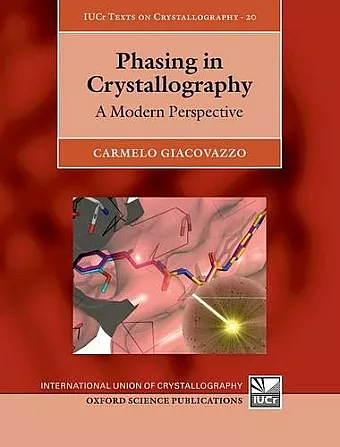Phasing in Crystallography
A Modern Perspective
Format:Hardback
Publisher:Oxford University Press
Published:12th Dec '13
Currently unavailable, and unfortunately no date known when it will be back

This book serves as a comprehensive guide to modern phasing techniques in crystallography, offering practical insights and accessible explanations.
The book Phasing in Crystallography provides an in-depth exploration of phasing techniques in contemporary crystallography. It is structured to offer a straightforward description of various methods, making the content accessible to both seasoned professionals and newcomers in the field. While the core text focuses on the practical aspects of these techniques, mathematical details are thoughtfully placed in the appendices for those who wish to delve deeper. This dual approach ensures that readers can engage with the material at their own level of expertise.
Modern crystallographic methods have evolved through the integration of two primary research streams: small-molecule and macromolecular crystallography. The small-molecule stream has successfully addressed the phase problem for molecules with up to 200 atoms in the asymmetric unit. Meanwhile, the remarkable progress made in the macromolecular stream has led to a wealth of protein structures being cataloged in the Protein Data Bank. This democratization of knowledge allows a broader range of laboratories to tackle complex protein structures, making it feasible for even young scientists to contribute significantly.
Phasing in Crystallography emphasizes the development of new probabilistic approaches designed to handle larger structures and experimental data errors. Traditional phasing techniques such as ab initio and molecular replacement have been revisited and refined. The text also highlights the advancements in computer science that have enabled rapid solutions to protein structures, which once took months or years. With a focus on clarity and accessibility, this book serves as a valuable resource for anyone engaged in the field of crystallography.
This textbook is recommended to those interested in direct methods of solving the "Phase Problem" in order to find the three-dimensional arrangement of atoms within a crystal by use of data from its X-ray diffraction pattern. It explains how best to assess the relative phase of each diffracted beam essential input for the calculation of an electron-density map of a crystal and how to do it correctly and efficiently. Methods used for macromolecules are also discussed. The book contains many excellent well thought-out illustrations and the mathematical equations are also clearly explained in the text. * Jenny P. Glusker, Fox Chase Cancer Centre and University of Pennsylvania *
Active researchers will find the book extremely useful in order to understand the historical developments, advantages, and limitations of the conceptually different methods for crystallographic phasing. Newcomers and students will find it a clarifying introduction and overview of the tools and trends available in modern crystallographic research. There is no doubt that the volume will soon be another landmark text in the world of crystallography. * Gilberto Artioli, University of Padova *
This book by Carmelo Giacovazzo is indeed a modern perspective of phasing in crystallography, as its title claims. In many parts of this work the author is asking provocative questions and provides well substantiated answers, while keeping the mathematics in the text to a minimum and deferring complicated derivations to carefully constructed appendices. Details of related theoretical works of the author and other writers are skipped wherever possible. This book is very likely to be appreciated by crystallographers interested in the principles of direct methods of phase determination as well as by those who would also like to see the mathematical material involved. * Uri Shmueli, Tel Aviv University *
This textbook of basic to advanced material is by one of the foremost experts on phasing methods in crystallography. Joint winner of the IUCr 2011 Ewald Medal and Prize, Carmelo Giacovazzo presents a coherent synthesis of mathematical methods for crystal structures of all molecule sizes as well as current practice in the discipline. The author describes what works today, within a helpful historical context, making it a book for our time. * John Helliwell, University of Manchester *
Clear and well written [] An excellent book aimed at those wishing to know the present state of phasing in crystallography. * Crystallography Reviews *
ISBN: 9780199686995
Dimensions: 247mm x 197mm x 25mm
Weight: 1076g
434 pages